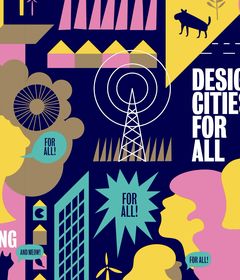Imagine living in a city that looks after its inhabitants, takes care of their surroundings, and enables people to care for themselves and others. What does such a city look like? How does it feel? In this series, we’re rethinking the city from a feminist and care perspective. Caring cities place people, health, safety, and collective wellbeing at the heart of decision making, emphasizing the value of paid and unpaid care work for all. Together with designers, researchers, artists, policymakers and activists we will uncover how we can (re)design cities, systems, spaces and human relationships to enable a culture of care grounded in values of compassion, empathy and equity for all.
In part 2, we will uncover how we can (re)design (mental) healthcare systems to be more accessible and equitable, while enabling physical and mental wellbeing for all.
Prof. dr. Floor Scheepers (Utrecht) focuses on enabling innovation with the aim of improving psychiatric care. In addition to apps, it is also about implementing ways of communication in which the patient is central. With the help of big data statistics, she and her team also analyze healthcare data and stories from patients and caregivers, with the goal to get a better picture of the complexity of psychological frailty. This creates new treatment insights and a continuous learning process. The aim is to facilitate “blended psychiatry”: the personal experience of the patient, the professional knowledge of the care provider and mixing knowledge from measurable data in the consultation and treatment process.
She is also the author of the book Mensen zijn ingewikkeld (People are complicated). In this book Floor Schepers pleas for acceptance of reality and letting go of model thinking in psychiatry and mental health care.
Glenn Helberg is a psychiatrist, educator and politician. He studied medicine and psychiatry in non-Western cultures; transcultural psychiatry. In 2019 he received the Black Achievement Award. This year he received the Jos Brink Oeuvre Prize as the ‘mental health father’ of the queer community. Recently, he also published the Book Als ik Luister (What if I listen) in collaboration with Irene Zwaan. In Als ik Luister, Glenn explores what events shaped him, such as the colonial past, the death of his mother at a young age and the fact that he is attracted to men. With a critical look at dominant Western thinking, he shows us how you can find more peace and harmony in our fast-paced existence with its hard demands.
Wing-Yan Man (Amsterdam) is the founder of 3310 School for Millennials. When Wing-Yan got a burnout at the age of 28. She quit her job at a big tech company and took a year off. With new knowledge about her own burnout experiences, she started the School for Millennials. As a Millennial, she believes the skill set to survive differs from other generations. You don’t have to teach them how to use a smartphone, but they do want to learn how to keep a healthy work-life balance. Being burnt out, she bumped into lots of these great lost-in-life dilemmas. She didn’t know where to go for help and had to learn the hard way how to pick herself up again, how not to live by approval from others and how to be kinder to herself. Recently, she also started hosting ‘It’s All Mental’ in collaboration with Pan Asian Collective. This talkshow facilitates a safe space to share perspectives and struggles about mental health within Asian cultures.
Dr. Hana Ali (Berlin) was born in Iraq, but moved to the UK with her family at the age of 5. She graduated from The University of Liverpool’s School of Medicine in 2017, after which she chose to explore a non-traditional graduation route and dove straight into the digital health industry. She moved to Berlin, where she still lives today, to run the medical department for a young digital start-up, before going on to study User Experience (UX) design. Hana then started her very own digital health venture, and is the Founder & CEO of Gaia Medical, a social enterprise and first-ever 1-for-1 online therapy service that’s on a mission to improve access to professional mental health care in Iraq and other countries in the MENA region.


Today, the American Psychiatric Association (APA), the oldest national physician association in the country, is taking an important step in addressing racism in psychiatry.>>

De psychiatrie probeert patiënten te vangen in categorieën en labels. Maar daarvoor is de mens te ingewikkeld, betoogt hoogleraar Floortje Scheepers>>.

Similar cultural roots don’t guarantee better bond, yet competence in learning about differences and being mindful of verbal and non-verbal cues are critical.>>

This year’s theme for the 2021 World Mental Health Day, “Mental Health in an Unequal World,” highlights the world’s unequal access to mental health services due to socioeconomic inequalities. Exemplifying the inequities surrounding mental health.>>

Centuries of female exclusion has meant women’s diseases are often missed, misdiagnosed or remain a total mystery.>>

Glenn Helberg (Willemstad, 1955) is psychiater en activist. Dit jaar ontving hij de Jos Brink Oeuvreprijs als ‘mental health father’ van de queercommunity. Op 14 september verschijnt het boek dat hij samen met Irene Zwaan schreef: Als ik luister. Persoonlijke reflecties over de complexiteit en diversiteit van ons bestaan.>>

In my Black community, therapy was stigmatized as something for people who could not handle challenges.>>












